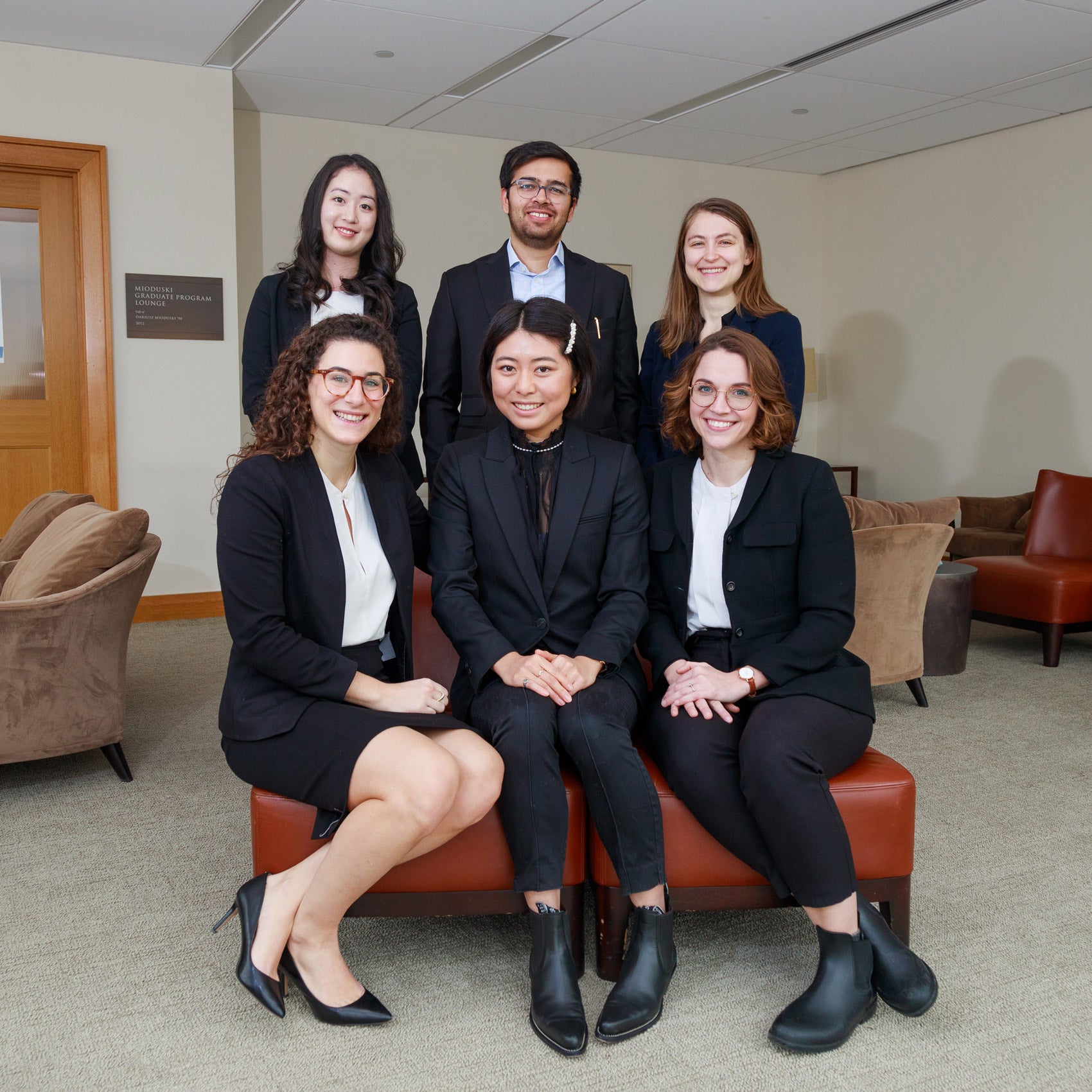Harvard Law School’s team has won the national round of the 2021-2022 Philip C. Jessup International Moot Court Competition and will advance to the international rounds, to be held from March 24 through April 10. The Harvard Law team, comprised of J.D. students Marta Canneri ’22, Katherine Shen ’22, Stephanie Gullo ’22, Nanami Hirata ’23 and Hannah Sweeney ’24, and coached by LL.M. student Shayan Khan LL.M. ’22, competed against teams representing 84 other U.S. law schools on a case involving disinformation and the freedom of expression, botnet takedowns, the secession of part of a nation’s territory, and foreign election interference. The memorials (written briefs) submitted by the Harvard team were ranked third out of the 85 submissions.
The Jessup competition is a simulation of a fictional dispute between two countries before the International Court of Justice, the principal judicial organ of the United Nations. It has long presented an opportunity for J.D. and LL.M. students to collaborate with each other. The very first Jessup event was a friendly competition between a team of HLS J.D. students (Tom J. Farer ’61 and William Zabel ’61) and a team of HLS LL.M. students (the late Bernard H. Clark LL.M. ’60 of New Zealand and the late Ivan Head LL.M. ’60 of the United Kingdom) in a case involving expropriation of property and diplomatic protection. More recently, it has offered international students in HLS graduate programs who participated in and/or coached Jessup and other moot court teams during their first law degrees the opportunity to coach and advise J.D. student team members participating in the competition for the first time.
In 2014, HLS won the U.S. Northeast Regional round, with J.D. team members Melissa Chastang ’14, Max Rosen ’15, Dean Rosenberg ’15, and Phil Underwood ’14, coached by Afroditi Giovanopoulou S.J.D. ’19 of Greece and James Grace LL.M. ’14 of Canada.
This year, coach Khan, who had participated in Jessup’s international rounds during his LL.B. studies in Pakistan, and subsequently served as a judge at the international rounds, was joined by team advisers Maria Laura Pessarini LL.M. ’22 and Andrew Loewenstein, a partner in the international litigation and arbitration practice at Foley Hoag.
But the team’s preparation was not limited to coaching. Each of the participants cites a number of factors, ranging from courses, clinics, and journals, to faculty support, that have contributed to their success. According to Stephanie Gullo, Peter L. Murray ’67, a visiting professor at HLS, runs a workshop on Oral Argument Before International Tribunals, and has steadfastly attended each round of the competition. Gullo also acknowledges the contribution of Visiting Professor Ioannis Kalpouzos, who helped the team to improve and sharpen their written advocacy skills.
Many of the team members cite Public International Law, a course taught by Professor Gabriella Blum LL.M. ’01 S.J.D. ’03, as cementing their interest in international law and laying a strong foundation for researching the issues that came up in this year’s case. According to Marta Canneri, “Professor Blum pushes her students to think critically and analytically about international law, a skill that has been indispensable while preparing for and competing in Jessup.” Hannah Sweeney and Nanami Hirata also credit reading groups with Blum (The Fog of War) and Professor of Practice Naz K. Modirzadeh ’02 (The Business of War), as well as Modirzadeh’s course on International Humanitarian Law/Law of Armed Conflict.
Shen, who serves with Canneri as a co-editor of the Harvard International Law Journal, notes that working on the journal allowed her to stay up-to-date on current scholarship, which often explores novel issues in international law. And Hirata indicates that she has been particularly grateful for the opportunity to be involved in the International Human Rights Clinic, which helped her to approach the human rights aspects of the Jessup problem from a different angle. Khan, their coach, found that he gained a deeper understanding of concepts like treaty interpretation, state responsibility, and diplomatic protection from International Investment Arbitration, a course taught by Visiting Lecturer on Law Yas Banifatemi LL.M. ’97.
“The members of the Jessup team, including our coach, are truly extraordinary human beings,” Shen adds. “Everyone is giving their all and it is this intensive yet collaborative and supportive environment that really enables the team to succeed.”
The application for team members and coaches for the 2022-2023 competition will be available in late spring; visit HLS’ Jessup website for more information.
